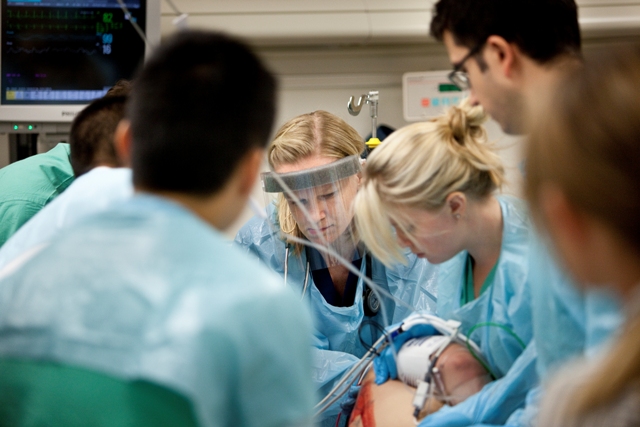Emergency Medicine Clerkship - EMR 440
The primary goal of the EMR 440 Clerkship is to teach medical students how to recognize and manage acute life-threatening conditions. The secondary goal is to develop the diagnostic skills necessary to evaluate patients with common symptoms such as chest pain or abdominal pain. To perform well in the course, students must have a solid foundation in Internal Medicine, Surgery and Pediatrics prior to starting this rotation.
Students must be enrolled in a U.S. LCME-accredited Medical School. We do not accept students from foreign schools. Students who have completed an Emergency medicine course at their own school are encouraged to apply for the acting internship: EMR-465.
Course Objectives
Teaching students to...
- Develop their skills and a fund of knowledge that will allow them to respond to any health-related emergency.
- Develop the thought process necessary to identify patients with occult diseases that are potentially catastrophic.
- Understand the role of the Emergency Physician in the delivery of health care in the US.
- Understand the appropriate referral of patients to the Emergency Department.
- Understand the role of the Emergency Department in relation to the overall function of the hospital.
- Recognize their own limitations and the need for consultation.
The EMR 440 course is a four-week course for medical students in their fourth year. The student will be expected to take focused histories and physicals and present them in a concise, clear fashion. The rotation consists of several components using multiple teaching approaches in diverse interactive learning environments for life-long learning.
- Experiential, Hands-On Training in the Clinical Setting: 14 shifts in the Emergency Department (missed shifts must be made up).
- Interactive Group Discussions/Labs: Topics include Toxicology, Trauma, wound management and airway management.
- Academic Conferences: Lectures every Tuesdy morning geared for resident and student education. Includes Grand Rounds and Morbidity & Mortality Conference..
- Journal Club: Once a month focusing on critically reviewing literature.
Grading
Grading is based on clinical performance during Emergency Department shifts. There is no exam or required case presentation.

